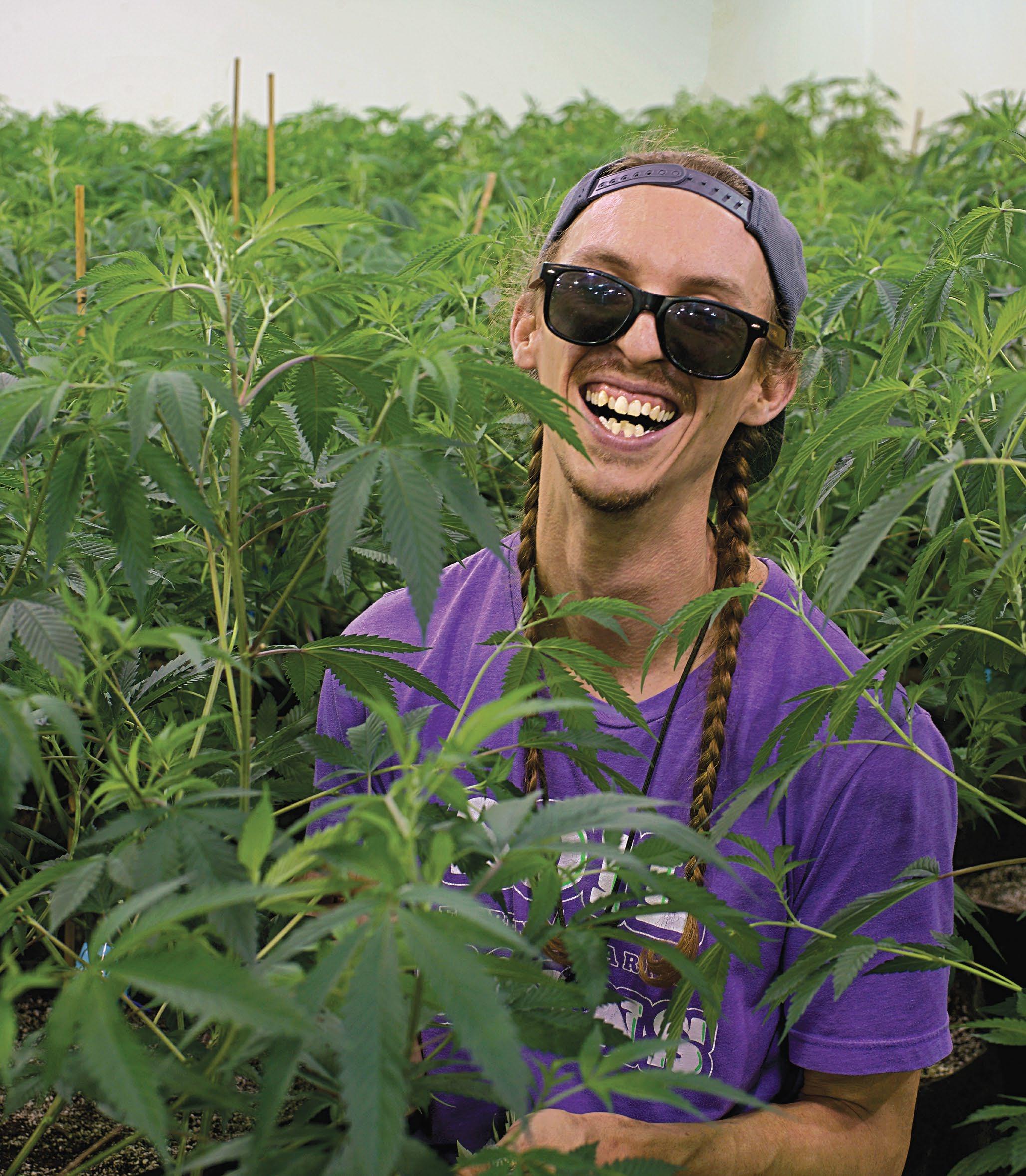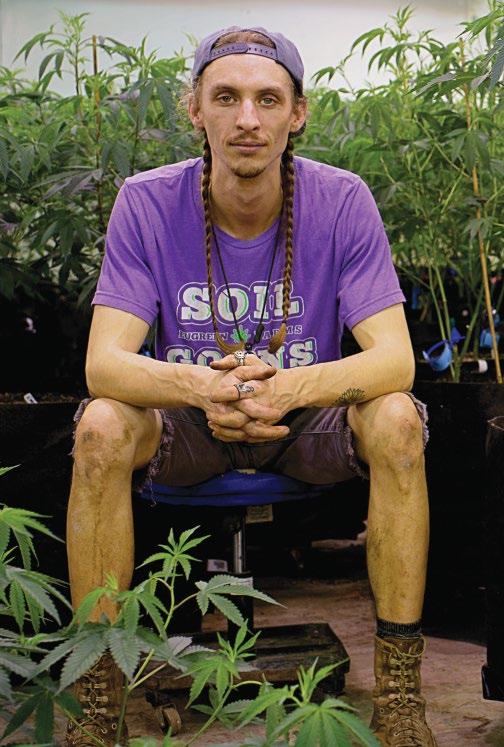
10 minute read
STONER OWNER NATHAN HOWARD
NATHAN HOWARD and his brother, Aaron Howard, founded East Fork Cultivars - and have since become one of the most respected craft Cannabis brands in Oregon, and in the United States. In recent months they have become vocal supporters of psilocybin psychotherapy, and have become strong supporters of the Oregon-based Psilocybin Science Initiative, which seeks to establish Oregon as the first staterun psilocybin therapy program. We connected with Nathan in February to discuss his experience and his goals with the mushroom-based medicine.
EAST FORK CULTIVARS NATHAN HOWARD
YOU’VE BEEN VOCAL ABOUT YOUR SUPPORT FOR PSILOCYBIN THERAPY. WHAT WAS YOUR FIRST EXPERIENCE WITH PSILOCYBIN?
I had my first of what I would call a macro-dose, or large dose of psilocybin earlier in 2018 - with my partner, Leslie, who was sober looking after me and essentially being what people call a shaman or a guide. She talked me through some stuff as I started to regain consciousness, and talked me through moderate discomfort toward the beginning and the end, when I was aware but in moderate paralysis.
And then, in the coming days, weeks and months now, she’s also talked with me and we’ve worked through some of the things that I realized in that moment and afterward. Patterns of behavior that I really dislike, ways of connecting with people that I really dislike or like - and want to foster more of or less of. It was a game-changer. I felt immediately - and it sustained - that I was able to connect with people better. I looked at my time in (Mayor Ted Wheeler’s) office working on politics a little bit better. I talked more with my parents about my brother Wesley’s passing in 2017. It kind of unlocked some... I think some of it was cognitive distortions, and some of them were just really well-worn behavior ruts that I couldn’t get out of.
HOW DO YOU THINK YOUR EXPERIENCE COULD TRANSLATE TO A CLINICAL SETTING? That process that we went through - it would be infused with best practices and would be much more rigid, and I’d have a better understanding of what I was ingesting and the whole supply chain. That is essentially what we’re talking about doing through the Psilocybin Service Initiative (PSI) in Oregon, the first state-legal and run psilocybin-assisted therapy program in the world that we know about. The reason we got more involved with PSI was because of that experience, where I took the leap and I knew that smaller doses of psilocybin and psychedelics can be helpful.
We know that MDMA has recognized federal uses and benefit. We know that the federal government has been researching LSD and psilocybin and psychedelics since the 1950s, and clinical studies have remarkable rates of success when it comes to things like smoking cessation, or end-of-life anxiety treatment, drug-resistant anxiety and depression treatment.”
WHAT IS THE MISSION BEHIND THE PSILOCYBIN SCIENCE INITIATIVE?
They’ve been working on what ultimately is a statewide ballot measure for no less than five years, with the goal of creating a program where people can walk in and get affordable psilocybin-assisted therapy. Our involvement, and my involvement, has been helping structure some of the campaign, helping staff. Tom and I talked about the possibility of me running the campaign.
I’ve consistently said no to paid political work, because I know it’s going to pull me away from East Fork, our family farm. I’d like to think that we’re at a point where it’s sustainable, and will survive until my children’s lifetime, but it still needs more work.
So my involvement has been as a volunteer, but helping with some of the politics of running a statewide ballot measure.
The campaign’s at the point now where we have several staff, several lead donors. Of course, you have Tom and Sheree, who are two of the best ambassadors for psychedelic medicine and the power of psychedelics and psilocybin in the world.
We’re collecting signatures to get it on the ballot, and we’ve got people out on the streets right now, talking to folks and getting the signatures. If we’re successful, we’ll have a campaign to win come November 2020. At the same time that we’ll be electing a new U.S. President … We’ll also be finding out whether or not Oregon has become the tip of the spear for progressive drug policy in the world.
WHAT DOES YOUR INVOLVEMENT – AND EAST FORK’S INVOLVEMENT – MEAN TO YOU AND THE COMPANY? We’re more excited about the space of plant-based medicine, generally, and psychedelics are essential to all of this, along with Cannabis. People on our team are public about their relationship with psychedelics. They’re public with the way that it has helped them with depression and anxiety.
The team and the East Fork founders, my brother Aaron and I, it’s personal to us. And it also aligns squarely in our mission around affordable plantbased medicine. We have people on the team that are excited about the Psilocybin Service Initiative.
Doing things like ending the war on drugs, creating affordable pathways for psilocybin therapy, educating around the benefits of psychedelics - that’s our mission. That’s who we are. If we just want to breed and grow Cannabis, that’s one thing.
But the fact that we’re focused on medicinal herbs generally, medicinal plants, requires us - if we’re going to stay true to our mission - to explore increasing access to psychedelics. The measure, the campaign, is not going to create a marketplace. It’s not going to create brands. At least I hope it doesn’t.

Wilson J. Griffin Using Cannabis to treat ulcerative colitis

WILSON J. GRIFFIN is a retired veteran from the United States Marine Corps who uses Cannabis to treat ulcerative colitis and other health issues. After being medically retired from the Marine Corps in 2014, he obtained his OMMP card the same year and began using Cannabis medicinally. As a wellrespected member of the Oregon Cannabis community, he has found our growers are always there to help patients in need. Griffin continues to pay this kind of Pacific Northwest hospitality forward through ongoing patient advocacy. ntil Griffin retired from the military, he could not aptly use Cannabis to treat his ongoing ulcerative colitis. For those who don’t know, ulcerative colitis is an irritable bowel disease that causes ulcers (sores) in the digestive tract. This ongoing inflammation causes a serious amount of pain, and in certain cases, can result in surgery. Luckly, Griffin resides in Oregon and has access to arguably the best Cannabis and related products in the country. “I use Cannabis to help maneuver through the battle of ulcerative colitis and all of its side effects,” reports Griffin. “I have found over the last eight years of flaring, this is just as much a physical battle as it is a mental battle. Cannabis helps me on the physical battlefront with the arthritis and joint pains, abdominal pain, anemia, nausea, loss of appetite and insomnia that often accompanies colitis. On the mental battlefront, Cannabis helps me keep my brain computer from going into overdrive and short circuiting from hypervigilance, stress, anxiety and depression. The ability to not immediately respond to outside/internal stress factors can be a blessing. Especially when one bad day can send a patient into a flare up. Where the mind goes, the body flows.”
One of the best aspects of Cannabis is that it helps a spectrum of health issues, so users can battle multiple ailments at once. Many Cannabis advocates like Griffin also experience mental health issues like anxiety and depression - on top of physical problems. Here, Cannabis is like a metaphorical blanket that soothes multiple symptoms at once.
“In my experience, I’ve found that strains, cannabinoids and terpenes are tools in the toolbox, and it’s up to the avatar to decide what tools work best for a specific mission,” says Griffin. “Linalool is one of the first terpene tools that I learned about, and happens to cover fire on the physical and mental sides of the battle. It helps activate your body’s parasympathetic response, which helps you rest and heal. LA Confidential and Grandaddy Purps do a fine job at taking the edge off of those waves of anxiety and depression. Jack Herer and Dutch Treat contain pinene, which is another terpene tool I find provides a good amount of abdominal/joint pain relief, while allowing me to still be active, clear headed, and get missions accomplished.”
Griffin doesn’t limit himself to one type of consumption when it comes to Cannabis. He has found that depending on what he is dealing with, that dictates how he goes about medicating himself. It’s important that Cannabis users understand different forms of Cannabis are more efficient in certain situations, and this knowledge takes time and trial-and-error to dial in.
“I have used this beautiful plant in about every way possible,” says Griffin. “I’ve found that its different forms provide different kinds of relief. U Some are used daily, and others as the situation dictates. If I’m feeling nauseous, can’t stop vomiting, or don’t have an appetite - my quickest way to relief would be to smoke some flower. If I have more deep and intense pain, and my bones and joints are feeling like a brittle pencil that’s about to snap, then I’ll break out the Echo Electuary live resins and heat up the trusty quartz banger for some dabs. If I’m getting a migraine (not a headache - a real migraine) then smoking or dabbing usually just makes it worse for me. So my technique is to rub my neck, temples, and hairline with a topical THC salve, drop a THC bath bomb in a hot bathtub, and soak that migraine away in the dark. Plus, I make sure to hydrate and sleep. I’ve used topicals on shingles when I’ve had them, and I’ve used Dirty Arm Farms Adabinol to help me drift away from insomnia. I use TJ’S CBD oil in the mornings like a multivitamin to help temper the intestinal inflammation experienced with ulcerative colitis and Crohns.” Despite his success with Cannabis, Griffin still deals with the unwarranted stigma around using Cannabis as a healthy and natural treatment option. His loved ones often don’t understand, which makes it difficult for Griffin to talk about his progress with the plant. Instead, he lets the quality of his health since using Cannabis do the talking for him, in hopes that his family will soon warm up to the idea of validating Cannabis as a worthy long term treatment option. Griffin admits it took time before he had his Cannabis profile dialed to exactly what he needed and what treatments worked the best for him. More information and dosage labels help, but it took him awhile to get his treatment just right. FINDING WHAT WORKS “If half of your family lives in a ‘reefer madness’ time machine like mine does, one may still find themselves battling the social stigmas with loved ones who don’t quite grasp the reality of their situation. Don’t worry, just love them like their respective entity would, and once they see how it helps your quality of life, they should begin to come around. If not, cut that baggage loose and watch the universe fill that gap with something beautiful. Also, dialing-in an individual’s patient profile has been one of the biggest challenges I’ve seen and experienced. It can take a lot of trial, error, and cold hard cash when it comes to finding out how each form of Cannabis affects your body. Once an individual dials in what works, will that strain or product consistently be available to them? And can they afford to purchase the necessary treatment amount on a regular basis? Always reach out. Always ask questions. We are a community, and the real gangsters will always help a patient in need. I would highly encourage everyone to always study what you are battling. And those looking to use Cannabis as treatment, learning to ‘catch your own fish’ is the surest way to make sure you’ve always got clean medicine on hand.”










